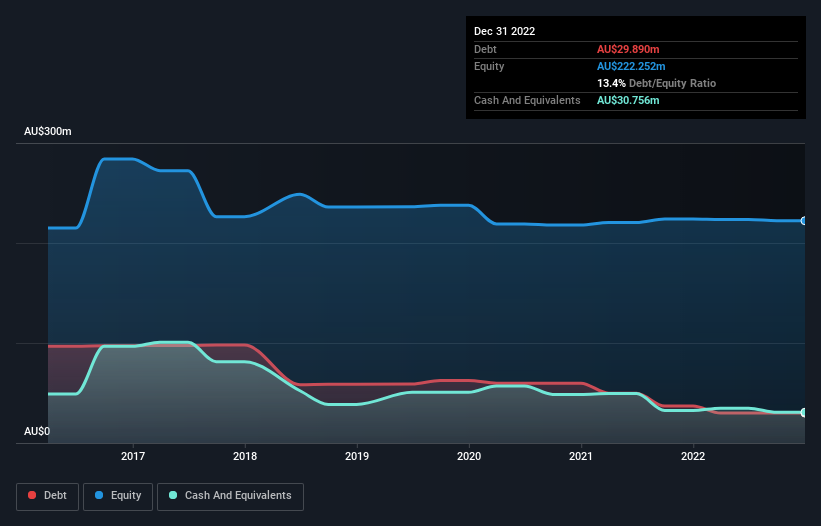Some say volatility, rather than debt, is the best way to think about risk as an investor, but Warren Buffett famously said that 'Volatility is far from synonymous with risk.' When we think about how risky a company is, we always like to look at its use of debt, since debt overload can lead to ruin. As with many other companies GTN Limited (ASX:GTN) makes use of debt. But is this debt a concern to shareholders?
When Is Debt Dangerous?
Debt assists a business until the business has trouble paying it off, either with new capital or with free cash flow. If things get really bad, the lenders can take control of the business. While that is not too common, we often do see indebted companies permanently diluting shareholders because lenders force them to raise capital at a distressed price. Of course, the upside of debt is that it often represents cheap capital, especially when it replaces dilution in a company with the ability to reinvest at high rates of return. When we think about a company's use of debt, we first look at cash and debt together.
Check out our latest analysis for GTN
What Is GTN's Debt?
As you can see below, GTN had AU$29.9m of debt at December 2022, down from AU$36.9m a year prior. However, it does have AU$30.8m in cash offsetting this, leading to net cash of AU$866.0k.

How Healthy Is GTN's Balance Sheet?
The latest balance sheet data shows that GTN had liabilities of AU$39.6m due within a year, and liabilities of AU$56.1m falling due after that. Offsetting this, it had AU$30.8m in cash and AU$48.1m in receivables that were due within 12 months. So its liabilities total AU$16.9m more than the combination of its cash and short-term receivables.
Given GTN has a market capitalization of AU$121.6m, it's hard to believe these liabilities pose much threat. However, we do think it is worth keeping an eye on its balance sheet strength, as it may change over time. While it does have liabilities worth noting, GTN also has more cash than debt, so we're pretty confident it can manage its debt safely.
It was also good to see that despite losing money on the EBIT line last year, GTN turned things around in the last 12 months, delivering and EBIT of AU$500k. When analysing debt levels, the balance sheet is the obvious place to start. But it is future earnings, more than anything, that will determine GTN's ability to maintain a healthy balance sheet going forward. So if you want to see what the professionals think, you might find this free report on analyst profit forecasts to be interesting.
Finally, while the tax-man may adore accounting profits, lenders only accept cold hard cash. While GTN has net cash on its balance sheet, it's still worth taking a look at its ability to convert earnings before interest and tax (EBIT) to free cash flow, to help us understand how quickly it is building (or eroding) that cash balance. Happily for any shareholders, GTN actually produced more free cash flow than EBIT over the last year. That sort of strong cash conversion gets us as excited as the crowd when the beat drops at a Daft Punk concert.
Summing Up
While GTN does have more liabilities than liquid assets, it also has net cash of AU$866.0k. And it impressed us with free cash flow of AU$12m, being 2,351% of its EBIT. So is GTN's debt a risk? It doesn't seem so to us. The balance sheet is clearly the area to focus on when you are analysing debt. But ultimately, every company can contain risks that exist outside of the balance sheet. These risks can be hard to spot. Every company has them, and we've spotted 2 warning signs for GTN you should know about.
When all is said and done, sometimes its easier to focus on companies that don't even need debt. Readers can access a list of growth stocks with zero net debt 100% free, right now.
New: Manage All Your Stock Portfolios in One Place
We've created the ultimate portfolio companion for stock investors, and it's free.
• Connect an unlimited number of Portfolios and see your total in one currency
• Be alerted to new Warning Signs or Risks via email or mobile
• Track the Fair Value of your stocks
Have feedback on this article? Concerned about the content? Get in touch with us directly. Alternatively, email editorial-team (at) simplywallst.com.
This article by Simply Wall St is general in nature. We provide commentary based on historical data and analyst forecasts only using an unbiased methodology and our articles are not intended to be financial advice. It does not constitute a recommendation to buy or sell any stock, and does not take account of your objectives, or your financial situation. We aim to bring you long-term focused analysis driven by fundamental data. Note that our analysis may not factor in the latest price-sensitive company announcements or qualitative material. Simply Wall St has no position in any stocks mentioned.
About ASX:GTN
GTN
Operates an advertising platforms that supply traffic and information content in Australia, the United Kingdom, Canada, and Brazil.
Flawless balance sheet and undervalued.
Similar Companies
Market Insights
Community Narratives



